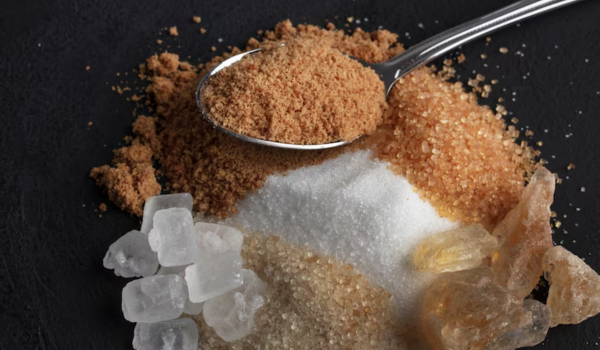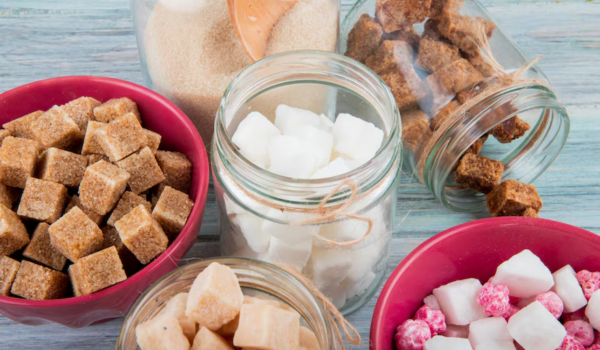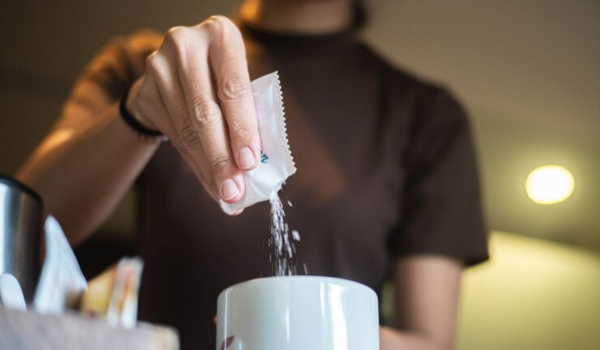Sucralose Artificial Sweetener: Good or Bad for You?
The Ultimate Guide to Sucralose Artificial Sweetener: Everything You Need to Know

In today’s health-conscious world, artificial sweeteners have become a popular alternative to sugar. Among them, sucralose stands out as one of the most widely used sugar substitutes.
You may have seen it in everything from diet sodas to sugar-free snacks, but what exactly is sucralose, and is it a healthy choice?
This comprehensive guide will walk you through everything you need to know about sucralose, its benefits, potential risks, and whether it’s truly a safe option for your health.
What is Sucralose?
Sucralose is a chlorinated artificial sweetener that is approximately 600 times sweeter than table sugar (sucrose).
It is made by replacing three hydrogen-oxygen groups on the sugar molecule with chlorine atoms, which makes the sweetener not only incredibly sweet but also highly resistant to metabolism in the body.
Unlike sugar, which is broken down and absorbed by the body for energy, sucralose passes through the digestive system without being absorbed, which is why it contributes zero calories.
This is one of the primary reasons sucralose has gained popularity as a sugar substitute in diet products and sugar-free food.
Sucralose is commonly sold under the brand name Splenda, although it can also be found in various other food and beverage products as an ingredient.
It was approved by the U.S. Food and Drug Administration (FDA) for use as a sweetener in 1998, and since then, it has become one of the most widely consumed artificial sweeteners worldwide.
How is Sucralose Made?
Sucralose is made through a multi-step chemical process that begins with sucrose (table sugar). The process involves chlorination, which changes the chemical structure of sucrose.
Here’s a simplified breakdown of how it’s made:
- Starting with Sugar: The process begins with regular sugar (sucrose), which is treated with chlorine.
- Chlorination: The chlorine atoms replace three of the hydroxyl (OH) groups in the sugar molecule.
- Purification: After chlorination, the sucralose is purified, and any residual impurities are removed.
- Final Product: The result is a sweet compound that is incredibly stable and cannot be metabolized by the body for calories.
This unique molecular structure is what makes sucralose so effective as a non-caloric sweetener. Since it cannot be broken down by the body, it provides no calories or nutritional value.
Why Is Sucralose So Popular?
Sucralose’s popularity stems from several key factors:
- Zero Calories: Since sucralose isn’t absorbed by the body, it doesn’t contribute any calories. This makes it an attractive option for individuals looking to reduce their caloric intake and manage weight.
- Sweetness Without the Sugar: Sucralose is about 600 times sweeter than table sugar, meaning only a tiny amount is needed to achieve the desired sweetness in food and drinks.
- Heat Stable: Unlike many other artificial sweeteners, sucralose is stable at high temperatures, which makes it ideal for use in baking and cooking without losing its sweetness. This is why it is commonly used in sugar-free baked goods, sauces, and other processed foods.
- Doesn’t Affect Blood Sugar: Unlike sugar, sucralose doesn’t cause a spike in blood glucose levels. This makes it a popular option for people with diabetes or those managing their blood sugar levels.
- No Aftertaste: Many artificial sweeteners leave an unpleasant aftertaste. Sucralose, on the other hand, is often praised for its clean, sugar-like taste without any bitter or metallic aftertaste that can be common with other sugar substitutes.
Health Benefits of Sucralose
Sucralose offers a variety of benefits that make it a common choice for those seeking to reduce sugar intake. Here are some of the potential health benefits:
1. Weight Management and Weight Loss
- Sucralose is a zero-calorie sweetener, meaning it can be used as part of a calorie-restricted diet to reduce overall caloric intake.
- Studies have shown that replacing high-calorie sugars with artificial sweeteners like sucralose can help people reduce their overall calorie consumption, which may contribute to weight loss or weight management.
- Since it’s much sweeter than sugar, only a small amount is needed to provide the desired level of sweetness. This makes it an effective tool in cutting down on overall calorie intake without compromising on taste.
2. No Effect on Blood Sugar
- One of the major advantages of sucralose is that it doesn’t raise blood sugar levels. Unlike regular sugar, which can cause a spike in glucose levels, sucralose passes through the digestive system without being absorbed.
- This makes it a safe option for individuals with diabetes or those looking to manage their blood sugar levels.
- Several studies have suggested that sucralose does not affect insulin sensitivity or glucose metabolism in individuals with diabetes, further supporting its use as a sugar substitute.
3. Supports Dental Health
- Unlike sugar, which contributes to tooth decay and cavities, sucralose is non-cariogenic, meaning it does not cause tooth decay.
- Since it doesn’t interact with the bacteria in the mouth, sucralose is considered tooth-friendly, making it a better option for oral health compared to sugary foods and beverages.
4. Suitable for People with Dietary Restrictions
- Sucralose can be an excellent choice for individuals with specific dietary restrictions, such as those following a low-sugar or low-carb diet.
- It’s also an option for people who need to reduce their intake of calories, fat, and carbohydrates without sacrificing sweetness in their food.
5. Helps in Managing Certain Health Conditions
- In addition to diabetes, sucralose may also be beneficial for people managing other conditions that require limiting sugar intake.
- For example, individuals with obesity, metabolic syndrome, or insulin resistance may find that sucralose helps them manage their conditions by reducing calorie and sugar consumption.

Is Sucralose Safe?
Sucralose has been extensively studied and reviewed by various health authorities, and it is generally considered safe for consumption in the amounts typically used in food and beverages.
1. FDA Approval
- The FDA approved sucralose for use as a sweetener in 1998 after reviewing more than 100 studies demonstrating its safety.
- The FDA set an acceptable daily intake (ADI) for sucralose at 5 milligrams per kilogram of body weight.
- This means that an average adult would need to consume an excessive amount of sucralose (many times more than is typically found in food and beverages) to exceed the recommended daily intake.
2. World Health Organization (WHO) and European Food Safety Authority (EFSA)
- Both the WHO and the EFSA have reviewed sucralose and concluded that it is safe for human consumption.
- Studies have found no evidence of harm to humans from consuming sucralose within the acceptable daily intake levels.
3. No Link to Cancer
- Some concerns have been raised about the potential links between artificial sweeteners and cancer. However, studies on sucralose have shown no evidence to support this claim.
- The National Cancer Institute and other health organizations have stated that there is no clear link between sucralose and cancer in humans.
4. Possible Side Effects
- While sucralose is considered safe for most people, some individuals may experience mild digestive issues such as bloating or gas if they consume large amounts.
- This is more likely to occur when sucralose is consumed in combination with other sugar alcohols, which can cause gastrointestinal distress.
Potential Risks and Concerns
While sucralose is generally considered safe, there are a few concerns that have been raised about its long-term use:
1. Effect on Gut Health
Some studies have suggested that consuming artificial sweeteners, including sucralose, may affect gut microbiota, the community of beneficial bacteria in the digestive system.
Altering the balance of gut bacteria could potentially lead to digestive issues, although the long-term effects are still not well understood.
2. Possible Impact on Insulin Sensitivity
Some research has indicated that sucralose may have a mild effect on insulin sensitivity, particularly in people who are not accustomed to consuming artificial sweeteners.
This could have implications for individuals with metabolic disorders, although the evidence is still inconclusive.
3. May Alter Appetite and Cravings
Some individuals report that consuming artificial sweeteners like sucralose can increase cravings for sweet foods, potentially leading to overeating.
This phenomenon is thought to occur because the body gets used to sweet tastes without the corresponding calories, which can disrupt normal appetite regulation.
How to Use Sucralose?
Sucralose is available in various forms, including packets, liquid drops, and granules, making it easy to incorporate into your diet. Here are some common ways sucralose is used:
- In Beverages: Sucralose is commonly found in diet sodas, iced teas, and coffee creamers. You can also use liquid sucralose drops to sweeten your coffee, tea, or smoothies.
- In Baking: Since sucralose is heat-stable, it can be used in baking without losing its sweetness. However, it may not provide the same texture or moisture as sugar in recipes, so you might need to adjust other ingredients when substituting.
- In Cooking: You can use sucralose to sweeten sauces, dressings, or marinades without worrying about it losing its sweetness during cooking.
- As a Table Sweetener: Sucralose packets are a convenient way to sweeten foods and beverages without adding extra calories.

Conclusion
Sucralose is widely considered safe for most people and offers several benefits, including zero calories, no impact on blood sugar, and convenience.
It’s a useful tool for weight management, blood sugar control, and maintaining oral health. However, like with anything, moderation is key.
There are a few potential risks, particularly when it comes to gut health, insulin sensitivity, and cravings, but these issues are generally not significant for most people.
If you consume sucralose as part of a balanced diet and don’t experience any adverse effects, it can be a good alternative to sugar.
If you’re concerned about the potential long-term effects or have specific health conditions (like digestive issues or insulin resistance), it’s always a good idea to consult with a healthcare professional before making sucralose a regular part of your diet.
Ultimately, sucralose can be a helpful tool for reducing sugar intake and controlling calories, but it’s important to use it in moderation and as part of a healthy, well-rounded diet.
.